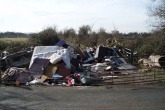New Crime Unit will target “gangsters” in the waste industry
The Environment Agency (EA) has launched an Economic Crime Unit to investigate serious financial offences in the waste sector. The new unit, an expansion of the EA’s Financial Investigations Team, aims to ensure waste operators “do the right thing” and prevent organised criminals making money from illicit waste activities.
 Highly skilled staff - including Accredited Financial Investigators, Accredited Financial Intelligence Officers and a Financial Crime Analyst - will work with partners across law enforcement, such as the police and HMRC.
Highly skilled staff - including Accredited Financial Investigators, Accredited Financial Intelligence Officers and a Financial Crime Analyst - will work with partners across law enforcement, such as the police and HMRC.
The EA is already one of three non-police law enforcement agencies with permission to access databases such as the Police National Computer, Police National Database and National Automatic Number Plate Recognition Service. Additionally, HMRC regularly shares customs export data to help identify illegal waste exports.
It is hoped that building on this intelligence-led approach will enable the Economic Crime Unit to proactively identify criminality and strategically target the biggest threats.
Specifically, the new unit’s Asset Denial Team will focus on account freezing orders, cash seizures, pre-charge restraints and confiscations. The Money Laundering Investigations Team will conduct dedicated money laundering investigations targeting environmental offences. A conviction for money laundering offences can result in 14 years in prison, acting as a strong deterrent for criminals considering offending in this way.
Emma Viner, the EA’s Enforcement and Investigations Manager, said: “Waste crime is financially motivated so we know investing our efforts in making sure it doesn’t pay will make it far less attractive to criminals.”
Executive Director of the Environmental Services Association (ESA), Jacob Hayler, added: “From fly-tipping to landfill tax evasion, waste crime is fundamentally a financial crime predicated on avoiding the cost of proper waste treatment in pursuit of maximum profit – leaving society and the natural environment to foot the bill while undermining legitimate business.”
As well as posing danger to the natural environment and human health, waste crime costs the English economy around £1 billion each year in lost tax revenue, clean-up costs and the loss of trade in legitimate businesses. Offences range from small-scale littering to the operation of illicit waste sites by organised gangs who may also be engaged in activities such as human trafficking, money laundering and the trade of drugs and illegal firearms.
In 2023, the EA's third national survey on the extent and nature of waste crime found almost a fifth of waste in England is handled illegally at some point in the waste stream. That’s 34 million tonnes of waste across England annually, enough to fill up to an estimated 4 million skips.
The establishment of the EA’s new Economic Crime Unit may be a positive step towards the Government achieving its aim of eliminating waste crime by 2043. Local authorities have previously raised concerns around the lack of funding and resources available to combat the issue.
Alan Lovell, Chair of the EA, commented: “Waste crime is a blight on communities and our environment… The Environment Agency is committed to taking tough action and the launch of our dedicated Economic Crime Unit shows we will not tolerate organised criminals moving into the waste sector and using it to facilitate other crimes.”









